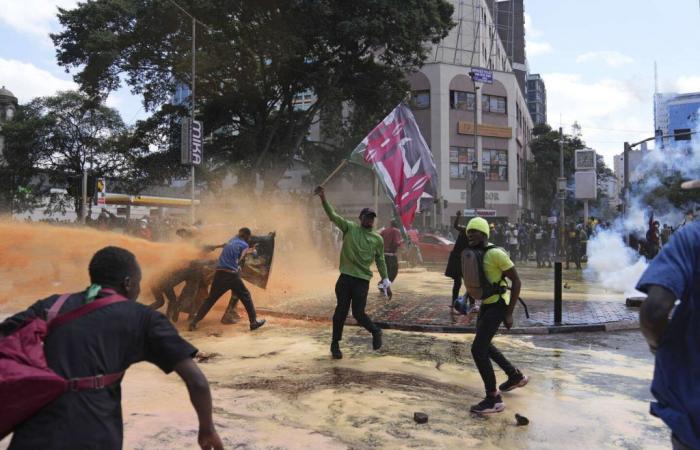The Kenyan president is trying to put an end to the wave of protests his country is experiencing. William Ruto announced, Wednesday June 26, the withdrawal of the 2024-25 draft budget providing for tax increases, at the origin of the powerful mobilization which descended into deadly violence on Tuesday.
“Having listened carefully to the people of Kenya, who have said loud and clear that they want nothing to do with this 2024 Finance Bill, I bow down and will not sign the 2024 Finance Bill into law, which will therefore be withdrawn »declared William Ruto in a speech the day after a day of demonstrations against this text which left twenty-two dead, according to the Kenya National Human Rights Commission (KNHRC), an official human rights organization.
“Following the passage of the bill, the country witnessed widespread expression of dissatisfaction with the bill as passed, which unfortunately resulted in loss of life and destruction Goods “added the head of state.
A “com operation”
“Since we got rid of the 2024 Finance Bill, there is a need to have a conversation as a nation going forward. (…) How can we manage our debt situation together? (…) I will propose an engagement with the young people of our nation, our sons and our daughters”he said.
Hanifa Adan, a leading figure in Kenya’s anti-government protest movement, on Wednesday called “com operation” the announcement by President William Ruto. “The bill is withdrawn but are you going to bring back alive everyone who died? »asked this journalist and activist on X.
The vote on the text on Tuesday by Parliament, where the presidential party Kenya Kwanza is in the majority, triggered the anger of demonstrators gathered not far away, in Nairobi. Quite calm for a week, the demonstrations turned into drama. Twenty-two people were killed during rallies against the government, Roseline Odede, president of the KNHRC, announced to Agence France-Presse (AFP) on Wednesday June 26.
Mme Odede said his organization had “opened an investigation”. A previous report given by the Kenya Medical Association had reported at least thirteen deaths following this day which turned into chaos.
The spokesperson for the UN Secretary General, Antonio Guterres, demanded that responsibilities be “clearly” established after the deaths of several protesters in Kenya. “When the police or security forces use deadly force, we want investigations to be carried out to clearly establish responsibility. And we have no doubt that the Kenyan justice system will achieve this”said Stéphane Dujarric.
Read also | In Kenya, demonstrations turn into riots
Add to your selections
Kenyan newspapers were shocked by the violence that took place during the protests. Wednesday June 26, the daily The Standard titled his number “Dead, disorder”, while the Daily Nation described the situation as “Pandemonium », believing that “the foundations of the country have been deeply shaken” by the numerous deaths and scenes of chaos that took place in the center of the capital, Nairobi.
The protesters stormed Parliament, a first in the history of the independent country since 1963. On Wednesday morning, June 26, a strong police presence was deployed around the state building, where the scent of tear gas was still in the air, AFP noted.
Police fired live ammunition, NGOs say
The rallies, mainly led by young people, began last week calmly. Thousands of people, marching in Nairobi and other cities across the country, protested against the new taxes planned in the 2024-2025 budget, currently being debated in Parliament. Tension suddenly rose on Tuesday, June 25, as opponents demonstrated for the third time in eight days.
Follow us on WhatsApp
Stay informed
Receive the essential African news on WhatsApp with the “Monde Afrique” channel
Join
According to NGOs, including the Kenyan branch of Amnesty International, the police fired live ammunition to try to contain the crowd, which forced security barriers to enter the Parliament grounds. Buildings were ransacked and partially burned, notably in Eldoret, in the Rift Valley, the president’s regional stronghold. Looting also took place in Nairobi and several towns.
The government subsequently deployed the army to support the police in the face of this “security emergency” and to these “destruction and intrusion into crucial infrastructure”. On the evening of Tuesday June 25, President Ruto displayed his firmness by pledging to firmly repress the “violence and anarchy”. In particular, he promised to make the “criminals posing as peaceful protesters” which “reign terror against the people, their elected representatives and institutions”.
Read also | Kenya protests: President vows to crack down on ‘lawlessness’
Add to your selections
The government was taken by surprise by the intensity of opposition to its tax hike plans, mainly led by young Kenyans from generation Z (born between 1997 and 2010). The main opposition coalition, Azimio, led by historic opponent Raila Odinga, accused the government of “unleashed his brute force” against the demonstrators and urged the police to “stop shooting innocent, peaceful and unarmed children”.
The international community “strongly” concerned
A group of NGOs, led by Amnesty International Kenya, also highlighted, Tuesday June 25, having noted twenty-one kidnappings of people by “officers in uniform or in plain clothes” over the previous twenty-four hours. Accusations to which the police, contacted by AFP, did not react. The violence and scenes of chaos in Nairobi have alarmed the United States and more than a dozen European countries, as well as the United Nations (UN) and the African Union (AU). They have declared themselves “strongly concerned” by the violence and called for calm.
The protest movement against taxes, called “Occupy Parliament”, was launched on social networks shortly after the presentation, in Parliament, on June 13, of the 2024-2025 draft budget. In particular, it provided for a value added tax (VAT) of 16% on bread and an annual tax of 2.5% on private vehicles. After the start of protests, the government, which considers new taxes necessary given the country’s high debt, announced on June 18 that it was withdrawing most of the measures planned for this purpose. But the demonstrators demand the complete withdrawal of the text.
Before Tuesday, June 25, the mobilization had already been marked by the death of two people in Nairobi, as well as dozens of injuries and hundreds of arrests.






